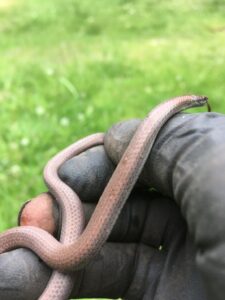— Amanda Azous
Most of us are familiar with garter snakes but there is another reptile fewer of us are familiar with in the Pacific Northwest: the Sharp-tailed snake (Contia tenuis). The Sharp-tailed snake is much smaller than a garter snake measuring up to 12 inches in length and having the thickness of a pencil. It’s fairly secretive and spends most of its time under cover so is rarely seen. It is typically found on south facing, rocky slopes and in small forest openings. Females lay between three and eight eggs in between rocks or among grass roots in late spring or early summer. Hatchlings emerge in the fall and are bright reddish brown and about the size of a large earthworm. Sharp-tailed snakes have been known to use communal egg-laying nest sites and sometimes even with other reptiles!
 The most distinguishing characteristic of this snake is the sharp spine-like scale at the tip of its tail. Scientists have speculated that Sharp-tailed snakes use their sharp tails to help stabilize slugs or other prey for capture as their long-recurved teeth may help the snakes grip and eat slippery prey. Insects and earthworms may also be on their menu. Predators of the Sharp-tailed snake include diurnal birds, small mammals and other snakes.
The most distinguishing characteristic of this snake is the sharp spine-like scale at the tip of its tail. Scientists have speculated that Sharp-tailed snakes use their sharp tails to help stabilize slugs or other prey for capture as their long-recurved teeth may help the snakes grip and eat slippery prey. Insects and earthworms may also be on their menu. Predators of the Sharp-tailed snake include diurnal birds, small mammals and other snakes.
Prior to 2013, there were only five recorded observations of sharp-tailed snake in western Washington and only one observation from the San Juan Islands. Since this species is known to inhabit the Sierra Nevada Mountains from Southern California to Southern British Columbia it is likely more common in the San Juan Islands than previously documented. A more comprehensive study held between 2013 and 2017, that relied on trained landowners produced nine total observations of Sharp-tailed snake on Cady Mountain, Mount Dallas, and Young Hill on San Juan Island, and Turtleback Mountain on Orcas Island.
Sharp-tailed snake hatchlings will curl into a ball when attacked making them hard for a predator to swallow. When picked up they will thrash about and press their tail spine against the predator to ward them off.

